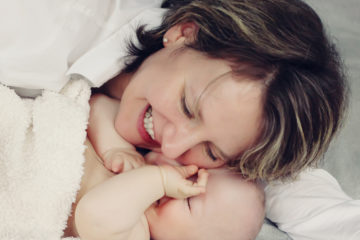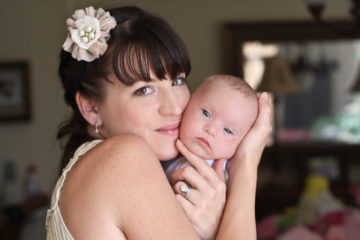Expectant parents have many concerns, including their other children. Parents ask themselves hard questions such as, “Will my other children be prevented from achieving their dreams and having a normal life?” Our pregnancy book references the research on positive impact on siblings, but Jennifer Meyers Bekins, MS, CCC-SLP, a speech language pathologist at The Jane and Richard Thomas Center for Down Syndrome, part of Cincinnati Children’s Hospital Medical Center, shares with us her first-hand experience. She has five siblings: Derek (30), Dan (27), April (22 with Down syndrome), Jacob (18 with Down syndrome), and Sam (13 with Down syndrome).
Dreams realized: the gift of Down syndrome
Jennifer Meyers Bekins, MS, CCC-SLP
As a nine-year-old little girl with two younger brothers all I wanted was to have a sister. I wished on stars, birthday candles, and dandelions for one. Then one day my mom came in my bedroom and wrote this in my diary:
August 24, 1987
“Mom told me she was pregnant.”
Yes! Pregnant! And I knew it was a girl. Not because we found out at the 20-week ultrasound. I knew all those wishes and prayers had finally paid off. And when she was born and I saw her fluffy blonde hair and big blue eyes. My parents even used the name I had chosen, April Joy, which like my new little sister, was perfect.
I found out soon after she was born that April had Down syndrome. I can’t remember if I knew anyone with Down syndrome. When April was nine months old I wrote that same diary:
January 18, 1989 1:45 pm
“Dear Diary, I’m sick with a stomac flue. I don’t have very much homework. My sister April Joy has Down syndrome! It’s not bad. You want her ex-tra chromozone?”
I remember asking my father and aunt if having Down syndrome meant April was “R-E-T-A-R-D-E-D?” My father was very gentle in his answer telling me he didn’t know. That she would probably learn things slowly. That he and my mother would love her just like us. She was one of us – family.
Even though I knew April had Down syndrome, she was still perfect in my mind. She just had this one little thing we needed to “fix.” At least that’s what I thought therapy was. The therapists were going to make Down syndrome go away. As an adult I realize that Down syndrome is part of who April is – and it’s not going away. And neither are her blue eyes or blonde hair. It’s one of the many things that make her who she is as a whole person.
“Will my children have a true sibling relationship with my child with Down syndrome?”
April is my sister. We’ve had our share of laughs and fights. But we enjoy just being sisters. She can talk to me about her love life and I can vent about our mother. Sisters.
My relationships with my youngest brothers Jacob and Sam are very different, not because they are adopted and have Down syndrome, but because of the large age difference. I moved away when they were only two and six years old, so I’m more like a close aunt. I’ve been happy to get to know them in their “teens” since they moved to Cincinnati with my parents and sister.
It is said that the sibling relationship is the longest relationship we experience. Parents of children with Down syndrome can nurture this relationship in the following three ways:
First, expect your children to be children together. Encourage game play, dress-up, dancing, sleeping bag camp-outs in the living room. Depending on age and birth order some children will be more likely to be little-mothers – they want to do everything for their sibling with Down syndrome. I was this way given a 10-year age difference between April and me, being the oldest, and being a girl. Make sure the sibling does not have too many responsibilities changing the role from sibling to helper or additional parent.
Second, create an atmosphere of consistency. Tell all the children in the household about your behavioral expectations. Some make a list of family rules that no one is allowed to break, including your child with Down syndrome. Statements such as, “Your sister doesn’t understand. She has Down syndrome,” will only foster frustration and resentment. Children with Down syndrome learn these exceptions early on much to the annoyance of their siblings.
Finally, understand that your child with Down syndrome is one member of the family. Make decisions that are for the best interest of the family and everyone will benefit. You will need to examine your financial decisions and preparations for the future. Decide with your spouse or partner how you are going to delegate time.
“Will a child with Down syndrome will take up a large amount of parental time, depriving the other children of attention?”
Doctor appointments, therapy visits, and school involvement may involve time away from other children. Talk with your children about how this makes them feel. Listen to them, give them support, and understand it is okay if you don’t have all the answers. Balance time spent on one child with a family movie, game night, or a “date” alone with each of your children.
I’ll be honest. We went to a lot of therapy visits, but my mother and siblings’ therapists did an amazing job including me the process. Conversely, April was included in our lives too. She came to swim team, basketball games, and soccer tournaments. We were a family. We enjoyed life together.
“Will my other children be prevented from achieving their dreams and having a normal life?”
I never thought, “Now that my sister is born I’ll never enjoy the life I was meant to live!” No, my life has not been normal. It’s been atypical — and richer, and fuller than I ever thought imaginable. My brothers, Derek and Dan, are in very different fields of study from my own, living full lives. Living with April, Jacob, and Sam did not prevent us from achieving our own very different dreams.
Now that I’m married and have two sons, I appreciate my siblings with Down syndrome even more. The relationship my sons have with my siblings with Down syndrome is different than with my brothers without Down syndrome, but that doesn’t mean it’s any less important. In fact, being involved as an adult with my siblings with Down syndrome has provided my children life-lessons on topics like acceptance, disability awareness, fairness, and civil rights.
“I’m afraid there will be only negatives, no positives, of having a sibling with Down syndrome.”
It is my hope that my perspective has alleviated this concern. It’s been nearly 23 years since April was born so I have the benefit of looking back on our childhood together. There were and continue to be laughs and tears, fights and late night chats. I did not choose to have a sister with Down syndrome and neither did my parents, but my wish did come true. She just came with something more than I’d expected.
Jennifer maintains Communication Skills for Life, a speech-language resource blog for parents, professionals, and friends of children with Down syndrome.
Our Resources
See also: Preparing Your Other Children chapter in our book, “Diagnosis to Delivery: A Pregnant Mother’s Guide to Down Syndrome.”
Jennifer Meyers Bekins, MS, CCC-SLP, a speech language pathologist at The Jane and Richard Thomas Center for Down Syndrome, part of Cincinnati Children’s Hospital Medical Center, shares with us her first-hand experience as the sister of three siblings with Down syndrome.


